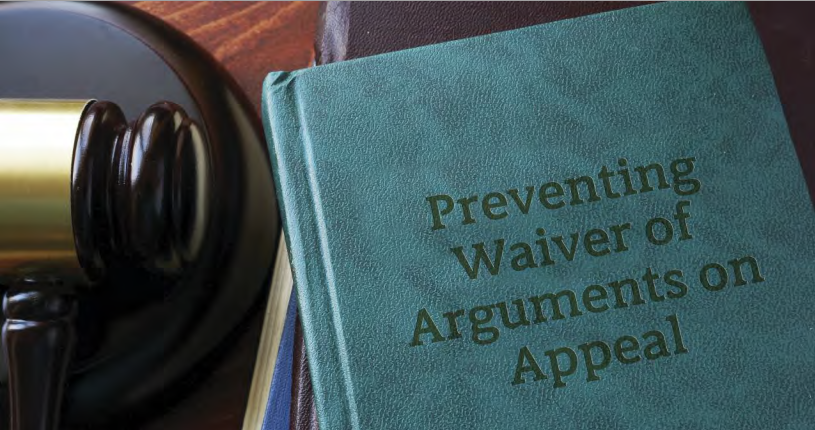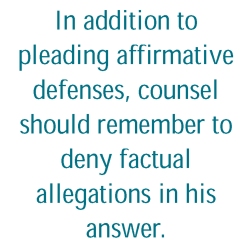Preventing Waiver of Arguments on Appeal
| Publication year | 2020 |
| Pages | 0050 |

Years of litigation can end based on one waiver at trial or on appeal.1 Whether and how an appellate court applies the principles of waiver to deny review of an question or issue is governed by "no general rule," but is left "primarily to the discretion of the courts of appeals, to be exercised on the facts of the individual cases." Singleton v. Wulff, 428 U.S. 106, 121 (1976). The appellate court's discretion, in turn, may be guided by the competing policies of fairness to the opposing party, the regard for the trial court's role, the caseload of the appellate court, the importance of the issue, and the practical realities of trial work, among others.2 In some appeals, this can boil down to the standard of waiver employed by the individual appellate judge to whom the case is assigned.
In an adversarial system of justice it is generally considered fair to afford the opposing party the opportunity to respond.3 Appellate courts are loath to reverse a trial court based on an argument that the trial court has not had an opportunity to rule on.4 And because of heavy caseloads, appellate judges generally do not have the time to canvas the record or to conduct extensive legal research to determine if a party's argument should prevail.
On the other hand, when an issue is of sufficient importance to the development of the law, an appellate court may address an otherwise inadequately preserved issue.5 Similarly, to preserve an issue, appellate judges may not require a perfect objection or argument in the midst of the hectic realities of trial.
In balancing those policies, individual appellate judges may have different standards for concluding that an argument or issue is waived. When different individual standards combine with collegial deference to the writing judge, the strictness of waiver can vary from case to case on the same court depending on which judge writes the opinion, unless the court adopts a uniform standard.
Because counsel cannot control the strictness with which an appellate court will apply waiver principles, it is prudent to adhere to a standard that would survive a strict review on appeal. This article addresses the general principles for when and how to raise arguments in civil and criminal cases to avoid waiver of an argument or issue on appeal.
When and How to Raise Arguments
As a starting point to avoid waiver, an argument should be raised in the trial court with citations to record evidence and supporting law, raised in time for one's opponent to respond, ruled upon by the trial court, and raised in one's initial appellate brief with citations to the record on appeal and supporting law.6 One should not assume that a footnote or a single sentence is enough to preserve an important issue at any stage of litigation. Counsel should also take care to comply with the rules at each stage of the litigation process, beginning with the complaint.
Preserving Error in the Trial Court
Complaint (Civil Cases)
In general, a claim must appear on the face of the well-pleaded complaint, or it is waived.7 Three specific rules also have an impact on the prevention of waiver. First, even where a claim is omitted from a complaint, it can be salvaged under Rule 15(b) of the Alabama Rules of Civil Procedure by being tried with the consent of the other party or upon a motion to conform the pleadings to the evidence.8
Second, when the constitutionality of a statute or municipal ordinance is at issue in an Alabama court, the attorney general must be notified of the issue and action.9 To be effective, the notice must be given in time for the attorney general to participate and act on it.10 Without the required notification, the trial court has no subject matter jurisdiction, any ruling on the case will be void, and no appeal can be taken.11
Third, for claims against a municipality, a plaintiff should notify that municipality within two years of the accrual of a claim for payment (six months in the case of a tort claim).12 Otherwise, the claim is barred.13
Motion to Dismiss (Civil Cases)
As a general rule, under Alabama Rule of Civil Procedure 12(b), certain defenses (i.e., lack of personal jurisdiction, improper venue, insufficiency of process, and insufficiency of service) generally should be raised in a motion to dismiss.14 If that defense is made by motion, it must be made before any responsive pleading.15 If a motion to dismiss based on lack of personal jurisdiction is denied and mandamus relief is sought and denied, there is nothing to prevent a future challenge to personal jurisdiction on appeal.16
Motions to Dismiss and Other Challenges to the Indictment and Grand Jury Proceedings (Criminal Cases)
Challenges to grand jury proceedings must be raised in a motion to dismiss the indictment filed after the indictment is returned, but before the defendant is arraigned.17 A challenge to the indictment itself must also be raised in a pretrial motion to dismiss, but the Alabama Rules of Criminal Procedure provide that it can be done at and not just before the arraignment.18 Any plea to an indictment at arraignment, whether guilty or not guilty, waives any challenge to the validity of the indictment or the sufficiency of the evidence considered by the grant jury unless that challenge is specifically reserved with leave of the trial court.19
Interlocutory Appeals (Civil Cases)
The failure to file an interlocutory appeal generally does not result in waiver of an issue in a later appeal from a final judgment.20 The Supreme Court of Alabama has held that the failure to file a petition for a writ of mandamus does not waive the right to challenge the denial of a trial byjury.21 With respect to the defense of improper venue, however, Alabama law is not settled. On the one hand, Alabama Code § 6-8-101 expressly provides that this defense can be appealed after a final judgment. On the other hand, Ex parte Children's Hospital of Alabama, 721 So. 2d 184, 191 n.10 (Ala. 1998), states that a failure to seek interlocutory review of a denial of a motion to dismiss for improper venue may waive that defense. Although Ex parte Children's Hospital does not address § 6-8-101, it would seem that the express words of the statute should prevail in a case where the statute is properly raised and argued.
Where an interlocutory appeal is taken by means of a petition for a writ of mandamus, a statement of good cause should be included if the petition is not filed within 42 days of the ruling or order that is the subject of the petition.22 Otherwise, the right to petition for relief is waived.23
Answer (Civil Cases)
Typically, "when a party has failed to plead an affirmative defense, it is deemed to have been waived."24 The Supreme Court of Alabama has explained:
Once an answer is filed, if an affirmative defense is not pleaded, it is waived. The defense may be revived if the adverse party offers no objection; or if the party who should have pleaded it is allowed to amend his pleading; or if the defense appears on the face of the complaint.25
Once waived, a defendant cannot revive an affirmative defense, even at summaryjudgment.26 Further, counsel must be specific in identifying the affirmative defense. In Pinigis v. Regions Bank, 942 So. 2d 841, 847-48 (Ala. 2006), for example, the court held that a party had waived an affirmative defense by pleading the "statute of limitations" instead of the more precise term "statute of repose." And in Ex parte Seriana, No. 1180104, 2019 WL 988465, at *3-4 (Ala. Mar. 1, 2019), the court explained that it is not enough to "reserve the right" to amend an answer to raise a defense instead of actually asserting a certain defense.

In addition to pleading affirmative defenses, counsel should remember to deny factual allegations in his answer. Failure to do so could result in an effective waiver of a defense. For example, in Matthews v. Alabama Agricultural and Mechanical University, 787 So. 2d 691, 697-98 (Ala. 2000), state university defendants did not file an answer or any other pleading denying the allegations in the plaintiff's complaint. The plaintiff had alleged that the defendants had acted willfully, maliciously, fraudulently, and beyond their authority, and the defendants presented no evidence that they were exercising a discretionary function. Id. Because the university defendants relied solely on the pleadings, the burden never shifted to the plaintiff to show that immunity did not apply. Id. The Alabama Supreme Court held that the defendants were not entitled to sovereign immunity or to discretionary-function immunity. Id.
Nonetheless, where an affirmative defense is argued at trial and the opposing party is not prejudiced, the supreme court has held that the defense was not waived by a failure to include it in the answer.27 Instead, the trial court was allowed to rule that the pleadings were amended to conform to the evidence under Rule 15.28
Preserving the Right to Appeal from a Guilty Plea (Criminal Cases)
To appeal a conviction entered on a guilty plea, a defendant must do two things. First, he must preserve the specific issue he intends to appeal by raising the issue in the trial court and obtaining an adverse ruling before entering the guilty plea.29 Second, the defendant must expressly reserve the right to appeal before entering his guilty plea. Otherwise, the defendant "is presumed to have abandoned all non-jurisdictional defects that occurred before the plea."30
Summary Judgment (Civil Cases)
At the summary judgment stage, waiver principles turn on whether the argument is raised by the winner or loser in the trial court and how the argument was made in that trial court. The loser at summary judgment can raise on appeal only those arguments that he made to the trial court.31 By contrast, the winner at summary judgment can raise...
To continue reading
Request your trial
